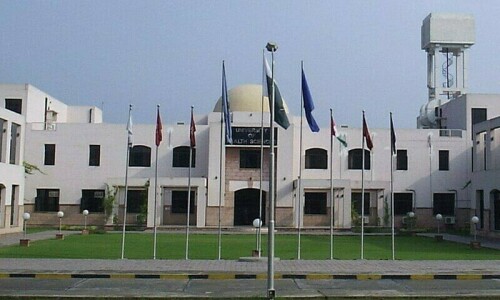LAHORE: Political economist Akbar Zaidi says debt is not a bad thing if it is used in a transparent manner with ensured accountability.
He was speaking at a consultation with civil society organisations titled “Public Debt-Impacts on State and Society”, organised by thee Institute for Social and Economic Justice (ISEJ) and the Islamic Relief Pakistan under campaign “Unlocking the chains of debt” at a local hotel on Thursday.
He said that in Pakistan successive governments, both democratic and non-democratic, had been bent upon borrowing recklessly. He said Pakistan’s debt situation demanded critical attention as the country was taking loans to repay interest on increasing debt. He stressed the need to improve the taxation system of Pakistan as main source of revenue generation. An effective taxation system would help reduce the debt dependency, he argued.
Prof Dr Qais Aslam said most part of the loaned money was misused and did not benefit the people, on whose name this money was contracted. Debt could be productive if used for projects to generate economic activities, but contrary to this programme loans were non-productive. The public debt of Pakistan needed a through inquiry to assess the real situation, he added.
The regional head of the Strengthening Participatory Organisation, Salman Abid, said the question of debt justice was linked with the patterns of governance. Besides the economic issue the debt is a political issue.
“We need to correct political discourse to get freedom from debts. All loan contracts should be approved by Parliament. In a country in which according to the government’s own reports poverty has risen and 58 percent of the population faces food insecurity, this additional burden means more miseries for the future generations of Pakistan,” he said.
Rights activist IA Rehman said a big chunk of the national budget was devoured by defense expenditures (38 per cent) and debt repayment (42 per cent).
“The government is left with no more than 5 per cent to spend on the social sector and human right development,” he said.
He said the governments in Pakistan had been addicted to foreign borrowing as to them it was an easy way to fill the fiscal deficit, particularly in the last three decades.
In 1973 the national budget statement reflected Pakistan budget as surplus.
“It proves that the real problem is bad governance,” he opined.
Emphasizing on the need for financial accountability he demanded ratification of all loan contracts by the Parliament. He urged the government to cut unnecessary expenditures and allocate more funds for human and social development.
Abdul Khaliq, ISEJ executive director, said the IMF intervention in Pakistan looked similar to its programme for Greece, which had deepened the recession in that country, reducing working people’s conditions to miserable levels, increasing unemployment, imposing deep wage cuts, and wiping out social programmes. He warned that Pakistan was sliding down towards debt trap and the government must review its irresponsible borrowing behaviour. He demanded that the government establish an independent debt audit commission to dig out truth on public debts of Pakistan
Hafiz Rashid Mehmood, Ateeq Rehman, Sarmad Iqbal, Shahid Usman and Bushra Khaliq also spoke.
Published in Dawn, May 29th, 2015
On a mobile phone? Get the Dawn Mobile App: Apple Store | Google Play













































Dear visitor, the comments section is undergoing an overhaul and will return soon.